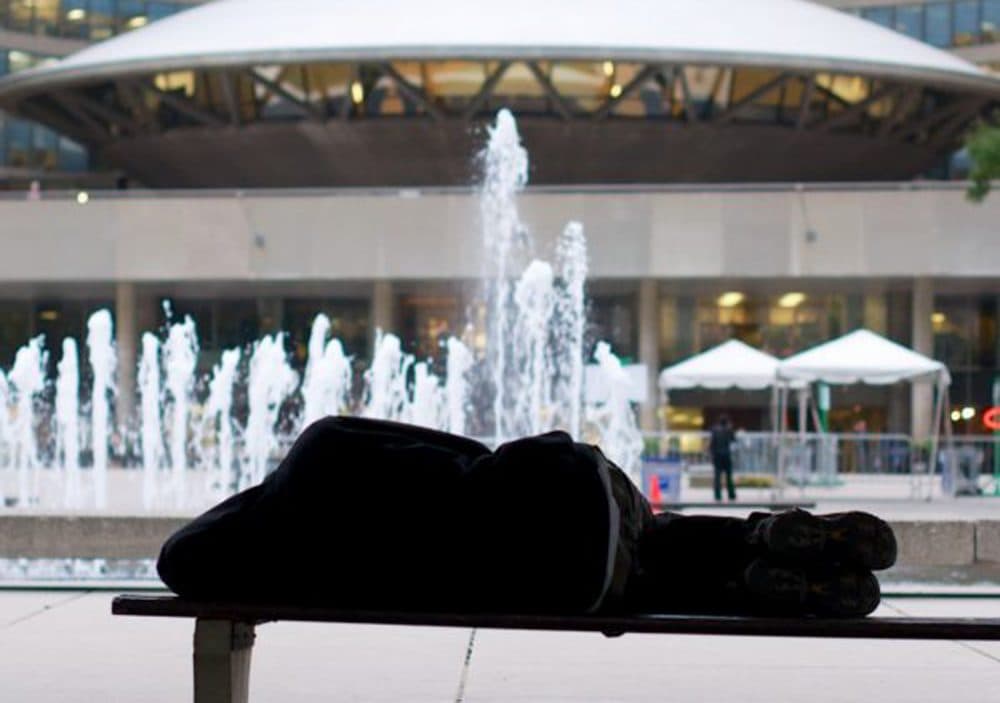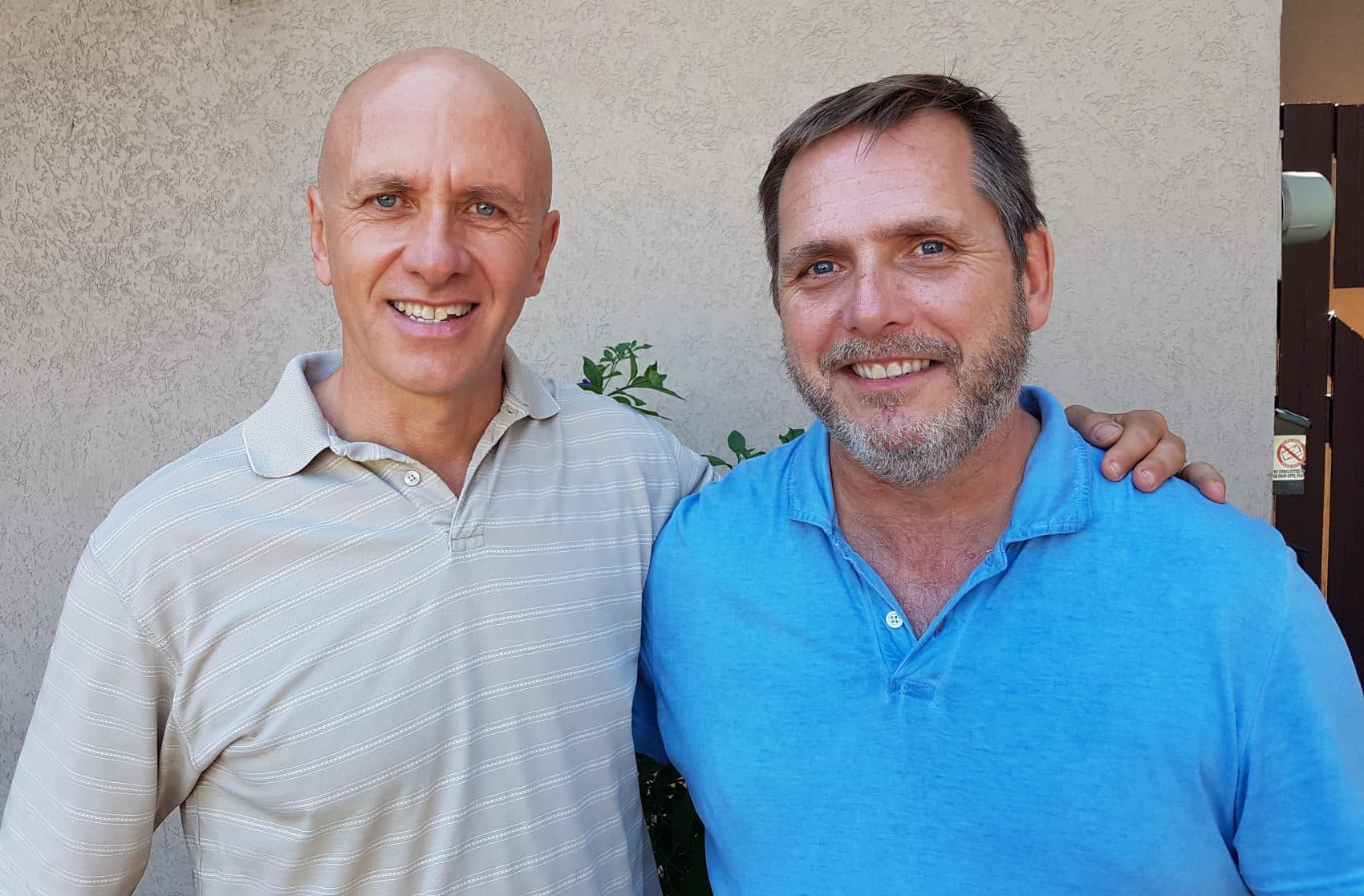Advertisement
The Little Giant

Subscribe to the Kind World podcast here -- and send us a message to share your story of kindness.
You never forget your first night without a bed. Just ask Curtis Bishop.
In his case, he remembers sitting on the front steps of a bank.
“I realized that it’s 3 o’clock in the morning, and you’ve got absolutely nowhere to go.”
Curtis grew up in a town in Newfoundland, Canada, so small that he didn’t encounter a homeless person until he was in his 20s. As an adult, he worked as an accountant -- “the type of person that really didn’t even like to get dirt under my fingernails,” he says.
“Before all of this happened, I looked at homeless people and my first instinct was to point a finger and try to blame them with my nose held high.”
While his early experience with homelessness was limited, mental illness was another story. He’s been depressed since he was a teenager.
“This led to a lot of drinking, a lot of drug use, and my life just spiraled out of control," he says.
By the time he was in his 30s, he was divorced, addicted and broke.
“I had stolen a lot of money, people were after me and there was nowhere else left to run,” he says. So he found himself on those steps in front of that bank, alone.
Advertisement
“Your first night there, you just sort of find a piece of ground and you lie on it. You stare up into the blackness and wonder what you’re doing there. You assume that it’s just a temporary thing and everything’s gonna be fine tomorrow. Just get through the night.”
But one night turned into two, turned into a month, turned into years of homelessness in Toronto and Ottawa.
“I’ve spoken to other homeless people and it’s a pretty common feeling, that sense that we’re invisible,” Curtis says. He often went months without speaking a word to another person.
He slept in parks, over grates or in basements. Then he found a box spring on the street and leaned it against a wall for cover. At night, he tied his feet in a discarded ‘child’s hoodie’ to keep them warm. But even that shelter couldn’t protect him.
One night in particular stands out. He was lying under his lean-to in Ottawa when he heard something that sounded like water landing on the box spring above him.
“At first, I thought it was probably rain, and then realized after a while, when you can hear the voices, what’s going on. A couple young guys are coming home at the end of the night, they see my lean-to, my box spring, and they decide this is going to be their target for urinating.”
Curtis crawled out from under the box spring and raised his head to say something to the men. Then something strange happened.
“When I opened my mouth, I just, I just growled at them. Grrrrrr. Almost like a dog’s growl,” he says. “It scared them a lot; it scared me even more. My words didn’t even work anymore.”
As years passed, homelessness felt like a fixed identity to Curtis. He imagined that just as successful people must feel they deserve their good fortune, he must deserve to walk the streets every day with his eyes on the ground.
He found some comfort in routine. Each day at noon, Curtis walked to a mall in Ottawa full of office workers on lunch break. He’d stand on a platform near the food court and look for people standing to leave.

“The secret was to get to that tray of food before the cleaners got there, eat what I could, and then I would bus that table and make sure it was left nice and tidy and go back to the little platform out front and start hunting again.”
One day — it was a Tuesday -- Curtis got the sense he was being watched. He scanned the room, and his eyes landed on a short man in a shirt and a tie who was staring at him. Curtis can still picture the stranger’s strawberry blond beard.
Anxious that the man watching him would complain to management, Curtis returned to scavenging. When he turned again, though, he saw that the man had left something at his table.
“At first I thought it was just a tray. There was no tray. The table had been wiped down. And the place was set with a knife on one side and a fork on the other and water and napkins.”
In the center was a plate of fresh hot food.
“I was very surprised the next Tuesday. He showed up again, and I watched him and I watched him and I watched him.”
The bearded man did the same thing. He wiped down the same table, set it and walked away.
“And he just stood there and watched and made sure I got what he had left for me. And then he went on.”
Tuesday after Tuesday, at 10 minutes to noon, Curtis knew he’d see the bearded man.
“He served me with a great deal of respect and dignity. It helped me with wanting to be a person again, I think,” Curtis says. He'd realized he wasn’t invisible.
“There would be like little grenades of truth that would explode in your head from time to time. And they would be basically, Because this person, who I look at with great respect, has some respect for me, then maybe I need to have some respect for myself.”
Their silent ritual went on for months. The men never spoke. Once, they caught each other’s eye from across the room and nodded at each other.

Then one day, Curtis didn’t show up at the food court. He didn’t need to. The bearded man’s gesture had been the push he needed to finally get help. Curtis got on welfare and never saw the bearded man again.
“I call him my little giant," Curtis says, "because he was a short man, but in my mind, he was a giant among men. A giant among people.”
Now, when Curtis faces a decision, he asks himself a simple question: “What would my little giant do?”
We want to hear your stories of kindness. Send Kind World a message, find us on Facebook or Twitter, or email kindworld@wbur.org.
You can subscribe to the podcast to make sure you don't miss an episode.
This story includes music by Chris Zabriskie (CC BY-NC 4.0). Thanks to Lincoln Clarkes and Darcy Quesnel for their photographs.
This segment aired on August 23, 2016.
